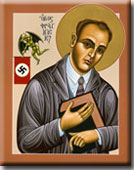 We rejoice! The Church has granted official recognition to Franz Jagerstatter, a Catholic conscientious objector from Hitler's army, as a martyr for the faith, thus clearing the way for his beatification and eventual canonization. On June 1, Pope Benedict XVI approved a series of decrees, issued by the Congregation for the Causes of Saints, that attributed martyrdom to Jagerstatter, a husband and father of three who was beheaded on August 9, 1943, for refusing any collaboration with the Nazis. We rejoice! The Church has granted official recognition to Franz Jagerstatter, a Catholic conscientious objector from Hitler's army, as a martyr for the faith, thus clearing the way for his beatification and eventual canonization. On June 1, Pope Benedict XVI approved a series of decrees, issued by the Congregation for the Causes of Saints, that attributed martyrdom to Jagerstatter, a husband and father of three who was beheaded on August 9, 1943, for refusing any collaboration with the Nazis. In our March visit to the Vatican, the Catholic Peace Fellowship was informed by Monsignor Robert Sarno of the Congregation for the Causes of Saints that this step was forthcoming. We were asked to wait for the official pronouncement, which came last Friday. A declaration of martyrdom enables a "Servant of God" to be beatified, or declared "Blessed" by the Church. For those who are not martyrs, proof of a miracle is required. Those with the title Blessed, according to Sarno, are worthy of both imitation and veneration by the faithful. All that remains for Jagerstatter to receive this title is for his home diocese of Linz, Austria, to set a date for the beatification liturgy. The next step after beatification is canonization - official recognition by the Church that this person is a Saint. Proof of a miracle received through the intercession of the beatified, subsequent to beatification, is needed for canonization. This requirement applies to all, including martyrs (those who have died for the faith) and confessors (those who have been persecuted and have suffered for the faith.) The Catholic Peace Fellowship has long held up Jagerstatter as an example of a Catholic whose conscience forbade him to participate in war (see "In Light of Eternity: Franz Jagerstatter, Martyr," published by the CPF Staff in 2003). This young man, despite a wild and rebellious youth, in his adulthood became a devout Catholic, a third-order Franciscan, and a church sexton for his local parish. Jagerstatter read and prayed over the Scripture and the lives of the Saints, and his conscience was shaped and formed by his active participation in the sacramental life of the Church. He understood that he was a part of the Kingdom of God and that, as a Catholic, his allegiance was to his "Eternal Homeland" - not to "the Fatherland." Although advised by his parish priest and local bishop that his duty was to serve his country and preserve his own life for the sake of his family, Jagerstatter held firm to his belief that to cooperate with the Nazis was to cooperate with evil, and so refused to join the military. Franz Jagerstatter was a conscientious objector, one to whom we look to, and now can pray to, for guidance. When confronted by skeptics on the issue of Christians and conscientious objection, we at CPF are often asked the following question: "What if all of the American Christians had become conscientious objectors during World War II?" We can now respond with even more confidence: "What if all the German Christians, like Jagerstatter, had become conscientious objectors?" We are a universal Church, not just an American Church. Hitler was only able to oversee the massive slaughter of six million Jews and others because ordinary people, most of whom were Christians, obeyed Hitler rather than God. The witness of Franz Jagerstatter reminds us of our duty of noncooperation with evil, and the crucial role that conscientious objection plays in the lives of the faithful. We rejoice that Franz Jagerstatter will soon be called Blessed, and hope that this recognition will encourage Catholics in every country to look more deeply into where their allegiances lie. We recall the words of Father Jochmann, the chaplain to J?gerst?tter while he was in prison: "I can say with certainty that this simple man is the only saint I have ever met in my lifetime." |
0 Comments:
Post a Comment
<< Home